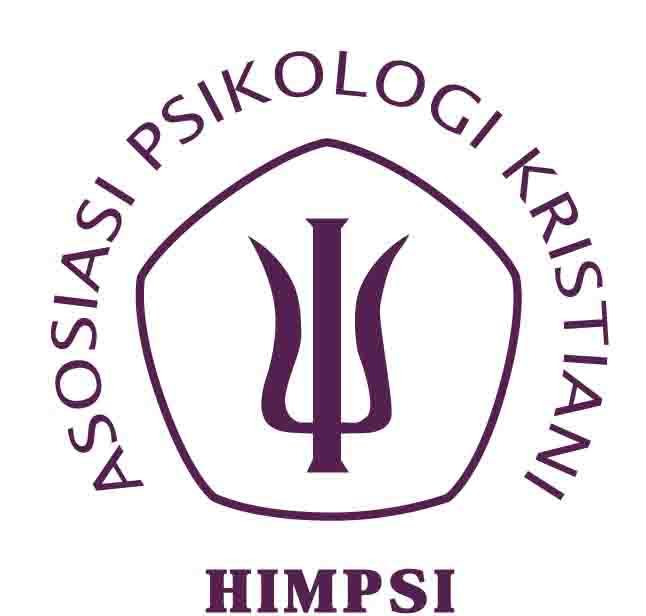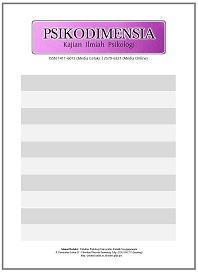Hubungan Kepemimpinan Etis, Budaya Organisasi, dan Kepercayaan Afektif dalam Membentuk Akuntabilitas Karyawan
Abstract
Akuntabilitas merupakan hal yang penting dan lumrah dituntut oleh organisasi pada karyawannya, karena membuat karyawan bertanggung jawab pada pekerjaannya. Akuntabilitas penting agar karyawan mengerjakan tugasnya dengan optimal, namun masih minim penelitian anteseden organisasional akuntabilitas karyawan (Pearson & Sutherland, 2017), terutama anteseden budaya organisasi dan kepercayaan. Studi ini bertujuan untuk mengetahui peran budaya kolaboratif dan kepercayaan afektif dalam menjelaskan hubungan kepemimpinan etis dan akuntabilitas karyawan. Alat ukur penelitian ini adalah skala kepemimpinan etis (2005), skala budaya kolaboratif (2004), skala kepercayaan afektif (2010), dan skala akuntabilitas karyawan (2003). Responden penelitian ini adalah 107 karyawan dari suatu organisasi pendidikan di Sumatera Utara. Pengolahan data dilakukan dengan SPSS PROCESS Hayes model 5. Hasil menunjukkan bahwa budaya kolaboratif dapat memediasi secara penuh hubungan kepemimpinan etis dan akuntabilitas karyawan. Selain itu kepercayaan afektif dapat menjadi moderator antara kepemimpinan etis dan akuntabilitas karyawan. Sebagai implikasi organisasi perusahaan baiknya menguatkan kualitas pemimpin etis, pemimpin memperkuat penerapan budaya kolaboratif dan membangun kepercayaan afektif dengan karyawannya, sehingga dapat membentuk rasa akuntabilitas karyawan dengan optimal.
Keywords
Full Text:
PDF (Bahasa Indonesia)References
Blau, P. M. (1964). Exchange and power in social life. Wiley.
Brees, J., & Ellen, B. P. (2022). Unaccounted for no more: Explicating managers’ role in accountability enactment. Journal of Organizational Behavior, 43(2), 310–326. https://doi.org/10.1002/job.2573
Brees, J. R., Sikora, D. M., & Ferris, G. R. (2020). Workplace accountabilities: worthy challenge or potential threat? Career Development International, 25(5), 517–537. https://doi.org/10.1108/CDI-10-2019-0257
Brown, M. E., Treviño, L. K., & Harrison, D. A. (2005). Ethical leadership: A social learning perspective for construct development and testing. Organizational Behavior and Human Decision Processes, 97(2), 117–134. https://doi.org/10.1016/j.obhdp.2005.03.002
BUMNInfo (2020, 29 September). Seri Akhlak Kementerian BUMN: Penyelarasan core values penting untuk tingkatkan mutu SDM. BUMNInfo. https://www.bumn.info/info-utama/seri-akhlak-kementerian-bumn-penyelarasan-core-values-penting-untuk-tingkatkan-mutu-sdm
Chen, V., Hsi, C., Yuan, M. L., Cheng, J. W., & Seifert, R. (2016). Linking transformational leadership and core self-evaluation to job performance: The mediating role of felt accountability. North American Journal of Economics and Finance, 35, 234–246. https://doi.org/10.1016/j.najef.2015.10.012
Choi, W., Kim, S. L., & Yun, S. (2019). A Social Exchange Perspective of Abusive Supervision and Knowledge Sharing: Investigating the Moderating Effects of Psychological Contract Fulfillment and Self-Enhancement Motive. Journal of Business and Psychology, 34(3), 305–319. https://doi.org/10.1007/s10869-018-9542-0
Dewi, R. C., & Riantoputra, C. D. (2019). Felt accountability: the role of personality and organizational factors. Journal of Management Development, 38(4), 312–322. https://doi.org/10.1108/JMD-12-2018-0375
Engelbrecht, A. S., Heine, G., & Mahembe, B. (2017). Integrity, ethical leadership, trust and work engagement. Leadership and Organization Development Journal, 38(3), 368–379. https://doi.org/10.1108/LODJ-11-2015-0237
Giessner, S. R., van Knippenberg, D., van Ginkel, W., & Sleebos, E. (2013). Team-Oriented leadership: The interactive effects of leader group prototypicality, accountability, and team identification. Journal of Applied Psychology, 98(4), 658–667. https://doi.org/10.1037/a0032445
Hall, A. T., & Ferris, G. R. (2011). Accountability and extra-role Behavior. Employee Responsibilities and Rights Journal, 23(2), 131–144. https://doi.org/10.1007/s10672-010-9148-9
Hall, A. T., Frink, D. D., & Buckley, M. R. (2015). An accountability account: A review and synthesis of the theoretical and empirical research on felt accountability. Journal of Organizational Behavior, 38(2), 204–224. https://doi.org/https://doi.org/10.1002/job.2052
Hochwarter, W. A., Parker Ellen, B., & Ferris, G. R. (2014). Examining the interactive effects of accountability, politics, and voice. Career Development International, 19(4), 358–380. https://doi.org/10.1108/CDI-01-2014-0012
Ko, C., Ma, J., Bartnik, R., Haney, M. H., & Kang, M. (2018). Ethical Leadership: An Integrative Review and Future Research Agenda. Ethics and Behavior, 28(2), 104–132. https://doi.org/10.1080/10508422.2017.1318069
Laird, M. D., Harvey, P., & Lancaster, J. (2015). Accountability, entitlement, tenure, and satisfaction in Generation Y. Journal of Managerial Psychology, 30(1), 87–100. https://doi.org/10.1108/JMP-08-2014-0227
Laird, M. D., Perryman, A. A., Hochwarter, W. A., Ferris, G. R., & Zinko, R. (2009). The Moderating Effects of Personal Reputation on Accountability-Strain Relationships. Journal of Occupational Health Psychology, 14(1), 70–83. https://doi.org/10.1037/a0012567
Lu, X. (2014). Ethical leadership and organizational citizenship behavior: The mediating roles of cognitive and affective trust. Social Behavior and Personality, 42(3), 379–390. https://doi.org/10.2224/sbp.2014.42.3.379
Mero, N. P., Guidice, R. M., & Werner, S. (2014). A field study of the antecedents and performance consequences of perceived accountability. Journal of Management, 40(6), 1627–1652. https://doi.org/10.1177/0149206312441208
Park, S. (2018). Measuring Accountability in the Performance Appraisal Context: Rater Status and Organization Culture as Determinants of Rater Accountability. Current Psychology, 37(1), 162–171. https://doi.org/10.1007/s12144-016-9499-y
Pearson, H., & Sutherland, M. (2017). The complexity of the antecedents influencing accountability in organisations. European Business Review, 29(4), 419–439. https://doi.org/10.1108/EBR-08-2016-0106
Pérez López, S., Manuel Montes Peón, J., & José Vázquez Ordás, C. (2004). Managing knowledge: The link between culture and organizational learning. Journal of Knowledge Management, 8(6), 93–104. https://doi.org/10.1108/13673270410567657
Rodríguez-Ardura, I., & Meseguer-Artola, A. (2020). Editorial: How to prevent, detect and control common method variance in electronic commerce research. Journal of Theoretical and Applied Electronic Commerce Research, 15(2), I–V. https://doi.org/10.4067/S0718-18762020000200101
Romzek, B. S., Leroux, K., & Blackmar, J. M. (2012). A Preliminary Theory of Informal Accountability among Network Organizational Actors. In Public Administration Review (Vol. 72, Issue 3, pp. 442–453). https://doi.org/10.1111/j.1540-6210.2011.02547.x
Samian, Riantoputra, C. D., & Budihardjo, A. (2020). Why employees endorse abusive leaders: the role of trust. Human Resource Development International, 00(00), 1–18. https://doi.org/10.1080/13678868.2020.1810475
Schein, E. H., & Schein, P. (2017). Organizational Culture and Leadership (5th Ed.). In The Innovator’s Discussion. Wiley. https://doi.org/10.4324/9781351017510-15
Schillemans, T., Overman, S., Fawcett, P., Flinders, M., Fredriksson, M., Laegreid, P., Maggetti, M., Papadopoulos, Y., Rubecksen, K., Rykkja, L. H., Salomonsen, H. H., Smullen, A., & Wood, M. (2020). Understanding Felt Accountability: The institutional antecedents of the felt accountability of agency-CEO’s to central government. Governance, August, 1–24. https://doi.org/10.1111/gove.12547
Schlenker, B. R., Britt, T. W., Pennington, J., Murphy, R., & Doherty, K. (1994). The Triangle Model of Responsibility. Psychological Review, 101(4), 632–652. https://doi.org/10.1037/0033-295x.101.4.632
Septiandari, A., Samian, & Riantoputra, C. D. (2021). Leader Humility and Employees’ Accountability During The Pandemic. International Research Journal of Business Studies, XIII(01), 13–26.
Steinbauer, R., Renn, R. W., Taylor, R. R., Njoroge, P. K., Journal, S., March, N., Taylor, R. R., & Njoroge, P. K. (2014). Ethical Leadership and Followers ’ Moral Judgment : The Role of Followers ’ Perceived Accountability and Self-leadership Ethical Leadership and Followers ’ Moral Judgment : The Role of Followers ’ Perceived Accountability and Self-leadership. 120(3), 381–392.
Wallace, J. C., Johnson, P. D., Mathe, K., & Paul, J. (2011). Structural and psychological empowerment climates, performance, and the moderating role of shared felt accountability: A managerial perspective. Journal of Applied Psychology, 96(4), 840–850. https://doi.org/10.1037/a0022227
White, S., & Rezania, D. (2019). The impact of coaches’ ethical leadership behaviour on athletes’ voice and performance: The role of accountability. Sport, Business and Management: An International Journal, 9(5), 460–476. https://doi.org/10.1108/SBM-11-2017-0079
Wikhamn, W., & Hall, A. T. (2014). Accountability and satisfaction: Organizational support as a moderator. Journal of Managerial Psychology, 29(5), 458–471. https://doi.org/10.1108/JMP-07-2011-0022
Yang, J., & Mossholder, K. W. (2010). Examining the effects of trust in leaders: A bases-and-foci approach. Leadership Quarterly, 21(1), 50–63. https://doi.org/10.1016/j.leaqua.2009.10.004
Zellars, K. L., Hochwarter, W. A., Lanivich, S. E., Perrewé, P. L., & Ferris, G. R. (2011). Accountability for others, perceived resources, and well being: Convergent restricted non-linear results in two samples. Journal of Occupational and Organizational Psychology, 84(1), 95–115. https://doi.org/10.1348/2044-8325.002004
Zoller, Y. J., & Muldoon, J. (2018). Illuminating the principles of social exchange theory with Hawthorne studies. Journal of Management History, 25(1), 47–66. https://doi.org/10.1108/JMH-05-2018-0026
DOI: https://doi.org/10.24167/psidim.v21i2.4633
Print ISSN : 1411-6073 | online ISSN : 2579-6321 View My Stats

This work is licensed under a Creative Commons Attribution 4.0 International License.




















